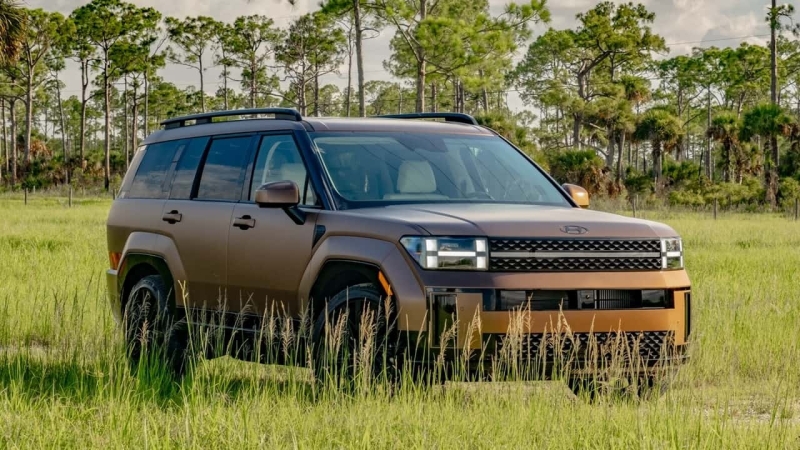The design is epic, the interior is beautiful, and the price is affordable. The Santa Fe is easily one of Hyundai’s best SUVs.
Jeff Perez / Motor1
Stanley Kubrick falls to his knees at the pearly gates as a gleaming monolith rises from a desert of soulless crossovers. It’s called the 2024 Hyundai Santa Fe. Finally, an SUV that doesn’t look like every other SUV. The masses hoot and holler.
Honestly, it’s ridiculous we had to wait this long for a modern, mainstream SUV to look this good. Sure, there are a few exceptions, but the Santa Fe is the first SUV in a long time that genuinely wowed me.
2024 Hyundai Santa Fe Calligraphy
Engine Turbocharged 2.5-Liter Four-Cylinder
Output 277 Horsepower / 311 Pound-Feet
Transmission Eight-Speed Dual-Clutch Automatic
Efficiency 20 City / 28 Highway / 23 Combined
Base Price $35,365
As-Tested Price $50,905
The dimensions are insane in person; Like, ‘How did this get approved?!’ insane. The surfacing of each panel is flat and every corner meets at a near-perfect 90-degree angle, as if it was sculpted from a single piece of aluminum. Drop your bone club and rub your hairy ape hands over any of the Santa Fe’s metal surfaces. You’ll have a hard time finding creases.
The eight-bit looking, H-shaped headlights help define the front end while flared, five-sided wheel arches fold over the tires like well-crafted origami. The blacked-out C pillars give the appearance of a one-piece greenhouse, and the Earthy Brass matte paint job is the perfect cherry on top of the brutalist aesthetic (+$1,000); You’d never see this color on a Honda CR-V.
Of course, looks are subjective. My siblings scoffed at the Hyundai’s “Minecraft-ass” design. Not every line and detail of the Santa Fe is perfect, I’ll give them that. The taillights should be a titch higher up on the tailgate (although, Hyundai says it was mandatory for larger struts on the liftgate), and if you don’t get the biggest wheel option, the Santa Fe looks like a block of cheese on Hot Wheels tires. Not great.
Controversial as the exterior might be, the cabin is straight-up stellar. On this Calligraphy model, there are more Nappa leather accents and aluminum trim pieces than most BMWs. In this case, a faux-textured matte wood trim lines the dash, perched between more leather and quirky H-shaped air vents—a nice nod to the headlights.
Two 12.3-inch touchscreens live together beneath a single piece of glass—one for the digital instrument cluster and another for the central display. Both of them are crystal clear and the infotainment system is seamless, easy to use, and quick to respond. Wireless Apple CarPlay and Android Auto both come standard.
There’s a third touchscreen beneath that center display for managing HVAC controls, and it works well enough. It’s still not as good as having hard buttons—I definitely had to look down while driving to use them—but the touchscreen does the job. Above and below that screen are two banks of buttons for quick-access options like turning off the automatic stop-start, drive modes, and more. That’s handy.
The Santa Fe is rich with features you probably never even considered. There are two wireless chargers ahead of the center console—one for you and one for your passenger. A novel concept. The center console itself opens traditionally for the driver and front passenger, of course, but it also has a rear-opening hinge so people in the second row can access it. Another thoughtful idea.
The second row is really the place to be. The Nappa leather captain’s chairs are ultra comfy and the roofline makes it feel ultra spacious. There’s a ton of headroom and legroom back there. The third row is fine for two adults over short trips with 30.0 inches of headroom and 37.7 inches of legroom. Ingress and egress are still tight, but the one-button-push folding second row means you don’t have to wrestle with the captain’s chairs, at least.
You’ll be plenty happy with the way the Santa Fe drives, too. A turbocharged 2.5-liter four-cylinder engine replaces the non-turbo version from last year. That upgraded motor makes 277 horsepower and 311 pound-feet of torque. It’s joined to an eight-speed dual-clutch transmission—an interesting choice for a three-row SUV.
The turbocharged engine is actually pretty punchy. It’ll get you to 60 miles per hour in about 6.6 seconds. There’s enough torque off the line to move the big-bodied SUV quickly and still plenty of power at highway speeds. The dual-clutch gearbox rips off nifty shifts when you’re hammering it, but it’s not as refined at low speeds. It was clunky around the grocery store parking lot.
The Santa Fe has no interest in moving quickly around corners, which is fine, but the steering is still lightweight and responsive—easy for maneuvering around town at low speeds. The suspension feels soft and absorbs blows well. And even at highway speeds the Santa Fe is whisper quiet. Not a peep of engine or road noise enters the cabin.
In terms of fuel economy, the Santa Fe falls somewhere in the middle of the pack. It gets up to 24 miles per gallon combined with front-wheel drive, but this all-wheel-drive Calligraphy model gets 20 mpg city, 28 highway, and 23 combined. That’s slightly worse than the Toyota Highlander (24 combined) but better than the Jeep Grand Cherokee (22 combined), Honda Pilot (21 combined), and Chevrolet Traverse (20 combined).
For an SUV this good, $35,365 feels like a small price to pay. The Calligraphy model is the most expensive at $47,895, and the one I drove costs $50,905 with the upgraded paint and carpeted floor mats. Fifty thousand dollars for a near-luxury SUV is still an absolute steal these days. A top-end Toyota Highlander Limited starts at more than $50,000 (and it’s not nearly as good), and the new 2024 Traverse is nearly $60,000 in RS form.
The new Hyundai Santa Fe is a standout in a segment littered with good but bland alternatives. Its bold exterior, beautiful interior, and reasonable price tag make it hard to pass on. Hyundai nailed it—again.
Jeff Perez / Motor1
Competitors
- Chevrolet Traverse
- Honda Pilot
- Kia Sorento
- Jeep Grand Cherokee
- Toyota Highlander
Get the best news, reviews, columns, and more delivered straight to your inbox, daily. Sign up For more information, read our
Privacy Policy and Terms of Use.



